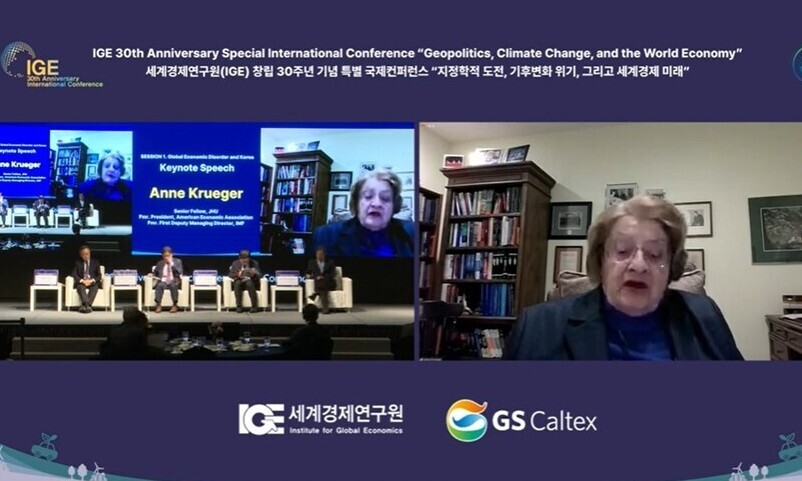hankyoreh
Links to other country sites 다른 나라 사이트 링크
Global economic experts warn Biden’s CHIPS and Science Act is unfeasible

Experts are predicting the global economic order will not be returning to its past multilateral free trade system with a resolution of trade and advanced technology conflicts between the US and China.
Critics also said the CHIPS and Science Act that the Joe Biden administration is using to rein in China is an unfeasible approach that will only increase the US’ fiscal deficit issues.
On Wednesday, an Institute for Global Economics international conference was held at the Grand InterContinental Seoul Parnas hotel on the topic “Geopolitics, Climate Change, and the World Economy.”
During the conference, Anne Krueger, the former first deputy managing director of the International Monetary Fund, said it was disappointing to see the Biden administration parting ways with the global free trade order and carrying on his predecessor Donald Trump’s tariff war with China by increasing its protectionist trade approach, including the terms of the CHIPS and Science Act.
She also cautioned that a turning point toward more protectionist trade could bring about a recession for the global economy bigger than anything experienced since World War II.
Voicing concerns that the US could expand its China containment policies to other industries besides semiconductors, Krueger said the target of producing all chips within US borders was unattainable and may be judged in the future as a terrible misstep by Biden.
In her analysis, the approach is poised to cause a major rise in the costs of various products manufactured in the US as its domestic semiconductor production unit costs rise by 40%–50% compared with the previous global division of labor.
If the administration attempts to resolve the cost issue with large subsidies, that would merely exacerbate the fiscal deficit issue, she warned. She went on to urge Biden to recognize the mistake and waste no time returning to the multilateral global trade system.
C. Fred Bergsten, the director emeritus at the Peterson Institute for International Economics (PIIE), delivered a keynote speech in which he warned that with the power battle taking place between the US and China, the global economy was in danger of facing a future without economic leadership.
In particular, he cautioned of the risks of massive losses similar to the disastrous period between World War I and II.
He stressed that China is more or less at the same level with the US at the moment, explaining that it already leads the US in terms of gross domestic product (based on purchasing power parity), foreign reserves, trade scale, and share of the global economic growth rate — and is likely to extend that lead in the next decade.
As an alternative approach, he suggested a “functional decoupling” in which both sides give in and end their five-year-long trade battle. He called for them to accept their differences in views on human rights, values, and national security and work toward ongoing pragmatic cooperation, including complementary reductions in their retaliatory tariffs for one another.
Stressing that the economic decoupling between the US and China has been disastrous for the global economy, Bergsten said the Biden administration was taking the wrong approach with the CHIPS and Science Act. As the country caught in the middle of this US-China rivalry, South Korea should show leadership as an active mediator, he urged.
Michael Spence, a Stanford University professor and Nobel Memorial Prize laureate in economic sciences, delivered a virtual speech warning that the global economy is experiencing a period of greater instability than any time since the early 1980s.
Explaining that he saw almost no possibility of the global economic order returning to a multilateral trade regime, he predicted that even with improvements in the currently chaotic US-China trade conflict, the multilateral trade system will remain much more complex and multilayered, with various forms of division and fragmentation continuing for some time to come.
By Cho Kye-wan, senior staff writer
Please direct questions or comments to [english@hani.co.kr]

Editorial・opinion
![[Column] Life on our Trisolaris [Column] Life on our Trisolaris](https://flexible.img.hani.co.kr/flexible/normal/500/300/imgdb/original/2024/0505/4817148682278544.jpg) [Column] Life on our Trisolaris
[Column] Life on our Trisolaris![[Editorial] Penalties for airing allegations against Korea’s first lady endanger free press [Editorial] Penalties for airing allegations against Korea’s first lady endanger free press](https://flexible.img.hani.co.kr/flexible/normal/500/300/imgdb/original/2024/0502/1817146398095106.jpg) [Editorial] Penalties for airing allegations against Korea’s first lady endanger free press
[Editorial] Penalties for airing allegations against Korea’s first lady endanger free press- [Editorial] Yoon must halt procurement of SM-3 interceptor missiles
- [Guest essay] Maybe Korea’s rapid population decline is an opportunity, not a crisis
- [Column] Can Yoon steer diplomacy with Russia, China back on track?
- [Column] Season 2 of special prosecutor probe may be coming to Korea soon
- [Column] Park Geun-hye déjà vu in Yoon Suk-yeol
- [Editorial] New weight of N. Korea’s nuclear threats makes dialogue all the more urgent
- [Guest essay] The real reason Korea’s new right wants to dub Rhee a founding father
- [Column] ‘Choson’: Is it time we start referring to N. Korea in its own terms?
Most viewed articles
- 160% of young Koreans see no need to have kids after marriage
- 2[Reporter’s notebook] In Min’s world, she’s the artist — and NewJeans is her art
- 3[Editorial] Penalties for airing allegations against Korea’s first lady endanger free press
- 4Months and months of overdue wages are pushing migrant workers in Korea into debt
- 5Presidential office warns of veto in response to opposition passing special counsel probe act
- 6Hybe-Ador dispute shines light on pervasive issues behind K-pop’s tidy facade
- 7Vietnamese war victims speak of sexual violence by S. Korean troops for the first time
- 8The BTS story that no Koreans would have believed a generation ago
- 9Inside the law for a special counsel probe over a Korean Marine’s death
- 10Japan says it’s not pressuring Naver to sell Line, but Korean insiders say otherwise